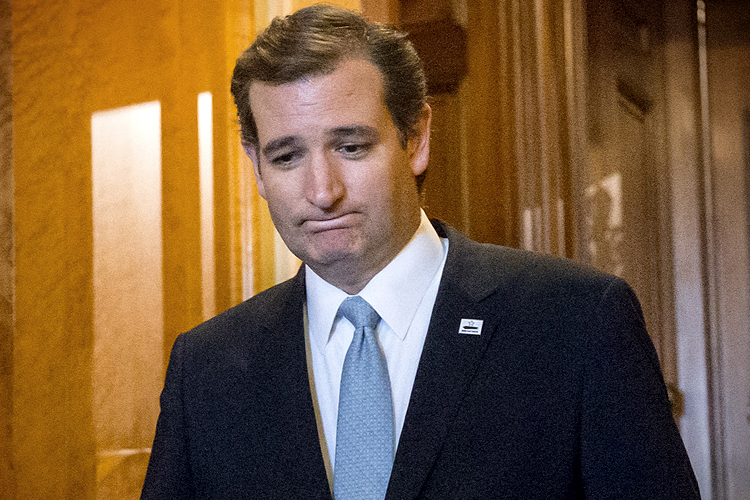The most important things about Ted Cruz and the Republican Party this weekend are all in the here-and-now: Will his efforts produce a government shutdown? A debt limit breach? Can this one first-year senator really manage to sabotage the U.S. economy with his quixotic campaign to overturn the 2012 elections?
But face it, beyond those clearly important concerns, lots of us also want to know how all of this affects Cruz’s 2016 presidential campaign. After all, many observers see his faux-libuster and the whole doomed defunding campaign mainly in the context of that campaign, and rightly so. And guess what? A quick PPP poll this week found Cruz at the top of the heap for the GOP nomination in 2016.
So has the whole defunding thing worked for Cruz’s campaign, regardless of what collateral damage it may wind up doing to the economy, the reputation of the Republican Party, and the ability of congressional Republicans to work together?
I’ve believed for some time that Cruz is basically a viable presidential candidate. But John Sides has pointed out, correctly, that Cruz’s run-ins with other elected Republicans could be costly to him – although I’ve also argued that Cruz’s run-ins with John McCain and with congressional leaders aren’t quite as risky as they may seem. This time, however, I think Cruz could be in real trouble.
Here’s why. I argued last time that this came up that the congressional portion of the party is relatively small, and frequently overrated by (Washington-based, usually) pundits. Not only that, but plenty of party actors – activists, those within party-aligned interest groups, even some governing and campaign professionals – fashion themselves as outsiders trying to take on a (perhaps mythical) establishment, and Cruz’s clashes with congressional Republicans could position him nicely with those who think of themselves as outsiders (never mind that these “outsiders,” like Cruz himself, are often the very core of the Republican Party, and that they are the ones who patrol its ideological boundaries).
So if it was just picking fights with John Boehner and John McCain, I might say that Cruz has helped himself, or at least that there’s an upside to go with the downside of opposition from one portion of the party. And I’d argue that it’s far from clear that the congressional portion of the party is important enough, nationally, to wield a veto over a candidate.
However, Cruz is doing more than picking a fight with Boehner and McCain. He is, for want of a better phrase, leading a crusade. And it’s a crusade that many conservatives in very good standing have said would be suicidal for the party.
That’s risky, because it puts more on the line than Cruz’s reputation for refusing to go along to get along: This time, he’s risking both his reputation as a leader and his reputation as a strategist. If this turns out badly for Republicans – if it ends with an embarrassing surrender, or even worse it ends with an embarrassing surrender after a costly government shutdown that’s perceived to hurt the GOP – then not only will Cruz take the bulk of the blame, but he’s going to lose his reputation for being smart and competent.
Sure, there are plenty of Tea Party Republicans who might not care. But Republicans who are driven by electoral incentives will care that Cruz might be a highly risky nominee to put at the head of the ticket. And Republicans who care about having an effective president (think, for example, of GOP-aligned interest groups) might well think twice if Cruz’s gambit blows up in his face.
Of course, plenty of Tea Partyers are going to regard the defunding effort as either a glorious victory (yes, they may believe that even if it appears objectively to be a flat-out loss) or as a stab-in-the-back defeat of a plan that was sure to work before those RINO squishes surrendered at the last minute. But beyond that group, and GOP-aligned media and other groups that respond more to profit motives than electoral incentives, Cruz could really destroy his reputation. And while it’s not clear that House and Senate Republicans have the clout within the party to stop a candidate, if they are helped by everyone who responds to electoral incentives then Cruz is probably toast.
Oh, and those polls? Don’t pay much attention to them. This far from the election, they’re mostly going to register either name recognition or recent media attention. Other Republicans will have their polling surges that will have come and be forgotten well before the Iowa caucuses.
Again, I’m certainly not counting Cruz out. He remains a viable candidate. But this week probably had a lot more downside than upside for his presidential campaign.

